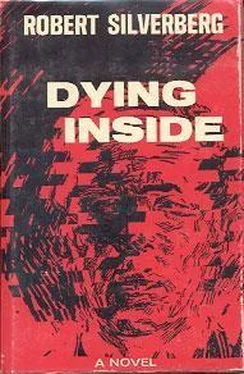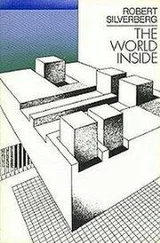Once he reaches the Cathedral, which he has been asked to show to the Italian (who, as we are not surprised to find, never keeps the date), the tension mounts. Joseph wanders through the building, which is empty, dark, cold, lit only by candles flickering far in the distance, while night inexplicably begins fast to fall outside. Then the priest calls to him, and relates the allegory of the Doorkeeper. It is only when the story is ended that we realize we did not at all understand it; far from being the simple tale it had originally seemed to be, it reveals itself as complex and difficult. Joseph and the priest discuss the story at great length, in the manner of a pair of rabbinical scholars disputing a point in the Talmud. Slowly its implications sink in, and we and Joseph see that the light streaming from the door to the Law will not be visible for him until it is too late.
Structurally the novel is over right here. Joseph has received the final perception that acquittal is impossible; his guilt is established, and he is not yet to receive grace. His quest is ended. The final element of the tragic rhythm, the perception that ends the passion, has been reached.
We know that Kafka planned further chapters showing the progress of Joseph’s trial through various later stages, ending in his execution. Kafka’s biographer Max Brod says the book could have been prolonged infinitely. This is true, of course; it is inherent in the nature of Joseph K.’s guilt that he could never get to the highest Court, just as the other K could wander for all time without ever reaching the Castle. But structurally the novel ends in the Cathedral; the rest of what Kafka intended would not have added anything essential to Joseph’s self-knowledge. The Cathedral scene shows us what we have known since page one: that there is no acquittal. The action concludes with that perception.
The Castle, a much longer and more loosely constructed book, lacks the power of The Trial. It rambles. The passion of K is much less clearly defined, and K is a less consistent character, not as interesting psychologically as he is in The Trial. Whereas in the earlier book he takes active charge of his case as soon as he realizes his danger, in The Castle he quickly becomes the victim of the bureaucracy. The transit of character in The Trial is from early passivity to activity back to passive resignation after the epiphany in the Cathedral. In The Castle K undergoes no such clearcut changes; he is an active character as the novel opens, but soon is lost in the nightmare maze of the village below the Castle, and sinks deeper and deeper into degradation. Joseph K. is almost an heroic character, while K of The Castle is merely a pathetic one.
The two books represent varying attempts at telling the same story, that of the existentially disengaged man who is suddenly involved in a situation from which there is no escape, and who, after making attempts to achieve the grace that will release him from his predicament, succumbs. As they exist today, The Trial is unquestionably the greater artistic success, firmly constructed and at all times under the author’s technical control. The Castle, or rather the fragment of it we have, is potentially the greater novel, however. Everything that was in The Trial would have been in The Castle, and a great deal more. But, one feels, Kafka abandoned work on The Castle because he saw he lacked the resources to carry it through. He could not handle the world of the Castle, with its sweeping background of Brueghelesque country life, with the same assurance as he did the urban world of The Trial. And there is a lack of urgency in The Castle; we are never too concerned over K’s doom because it is inevitable; Joseph K., though, is fighting more tangible forces, and until the end we have the illusion that victory is possible for him. The Castle, also, is too ponderous. Like a Mahler symphony, it collapses of its own weight. One wonders if Kafka had in mind some structure enabling him to end The Castle. Perhaps he never intended to close the novel at all, but meant to have K wander in ever-widening circles, never arriving at the tragic perception that he can never reach the Castle. Perhaps this is the reason for the comparative formlessness of the later work: Kafka’s discovery that the true tragedy of K, his archetypical hero-as-victim figure, lies not in his final perception of the impossibility of attaining grace, but in the fact that he will never reach even as much as that final perception. Here we have the tragic rhythm, a structure found throughout literature, truncated to depict more pointedly the contemporary human condition—a condition so abhorrent to Kafka. Joseph K., who actually reaches a form of grace, thereby attains true tragic stature; K, who simply sinks lower and lower, might symbolize for Kafka the contemporary individual, so crushed by the general tragedy of the times that he is incapable of any tragedy on an individual level. K is a pathetic figure, Joseph K. a tragic one. Joseph K. is a more interesting character, but perhaps it was K whom Kafka understood more deeply. And for K’s story no ending is possible, perhaps, save the pointless one of death.
That’s not so bad. Six double-spaced typed pages. At $3.50 per, it earns me a cool $21 for less than two hours’ work, and it’ll earn the brawny halfback, Mr. Paul F. Bruno, a sure B+ from Prof. Schmitz. I’m confident of that because the very same paper, differing only in a few minor stylistic flourishes, got me a B from the very demanding Prof. Dupee in May, 1955. Standards are lower today, after two decades of academic inflation. Bruno may even rack up an A—for the Kafka job. It’s got just the right quality of earnest intelligence, with the proper undergraduate mixture of sophisticated insight and naive dogmatism, and Dupee found the writing “clear and forceful” in ‘55, according to his note in the margin. All right, now. Time out for a little chow mein, with maybe a side order of eggroll. Then I’ll tackle Odysseus as a Symbol of Society or perhaps Aeschylus and the Aristotelian Tragedy. I can’t work from my own old term papers for those, but they shouldn’t be too tough to do. Old typewriter, old humbugger, stand me now and ever in good stead.
Aldous Huxley thought that evolution has designed our brains to serve as filters, screening out a lot of stuff that’s of no real value to us in our daily struggle for bread. Visions, mystical experiences, psi phenomena such as telepathic messages from other brains—all sorts of things along these lines would forever be flooding into us were it not for the action of what Huxley called, in a little book entitled Heaven and Hell, “the cerebral reducing valve.” Thank God for the cerebral reducing valve! If we hadn’t evolved it, we’d be distracted all the time by scenes of incredible beauty, by spiritual insights of overwhelming grandeur, and by searing, utterly honest mind-to-mind contact with our fellow human beings. Luckily, the workings of the valve protect us—most of us—from such things, and we are free to go about our daily lives, buying cheap and selling dear.
Of course, some of us seem to be born with defective valves. I mean the artists like Bosch or El Greco, whose eyes did not see the world as it appears to thee and me; I mean the visionary philosophers, the ecstatics and the nirvana-attainers; I mean the miserable freakish flukes who can read the thoughts of others. Mutants, all of us. Genetic sports.
However, Huxley believed that the efficiency of the cerebral reducing valve could be impaired by various artificial means, thus giving ordinary mortals access to the extrasensory data customarily seen only by the chosen few. The psychedelic drugs, he thought, have this effect. Mescaline, he suggested, interferes with the enzyme system that regulates cerebral function, and by so doing “lowers the efficiency of the brain as an instrument for focusing mind on the problems of life on the surface of our planet. This . . . seems to permit the entry into consciousness of certain classes of mental events, which are normally excluded, because they possess no survival value. Similar intrusions of biologically useless, but aesthetically and sometimes spiritually valuable, material may occur as the result of illness or fatigue; or they may be induced by fasting, or a period of confinement in a place of darkness and complete silence.”
Читать дальше












